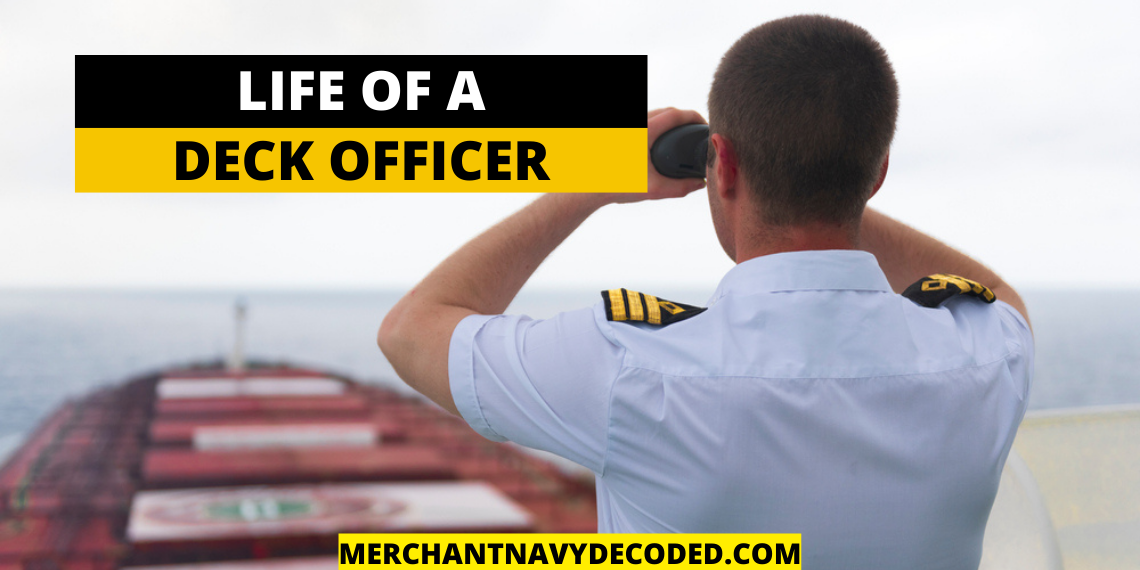Life of a Merchant Navy Officer – Deck
Most of you guys must have seen pictures of merchant navy officers in uniforms, keeping a watch in the bridge with binoculars in hands. And you must have thought, what a glamorous lifestyle these guys have! But in reality, that’s just a small part of their daily lives. There’s much more to being a Merchant navy officer than wearing cool sunshades with a white uniform and posing for a picture.
The job of a deck officer is very vast and is not just limited to one thing. He/she needs to be the Jack of all trades and needs to have a basic understanding of almost every piece of equipment and machinery on board. Not only this but deck officers also have to keep up with a lot of paperwork and reports that have to be sent to the company on a daily basis.
Basic Duties of Merchant Navy Officer – Deck Side
Bridge Watchkeeping Duties of a Merchant Navy Officer
Bridge watchkeeping is the primary and the most important job of a Merchant navy officer in the deck department. Bridge watchkeeping is a period of 4 hours (sometimes it can be 6) during which deck officers are responsible for the safe navigation of the ship and the safety of the cargo on board, taking into consideration the weather conditions, risk of collision, and position of surrounding vessels.
Almost every Merchant navy officer in the deck department has to keep 8 hours of bridge watch every day and during this time they have to be really alert and well aware of the surroundings as the safety and security of the ship, cargo and the entire crew depends on them. Deck officers are assigned lookouts who assist them during these bridge watches. The duty of a lookout is to stay vigilant all the time and report to the duty officer if they see anything suspicious or sense that there is a risk of collision. AB or Able-bodied seamen are mostly assigned as lookouts during these bridge watches, even Deck cadets serve as a lookout during Chief Officer’s watch. The Duty officer can call the Captain/Master in case he is in any doubt.
Watchkeeping schedule onboard
Although this is not the same for every vessel and depends on the total strength of officers in the deck department. But the following schedule is followed on most ships.
| 0000 – 0400 / 1200 – 1600 | 2nd Officer, Duty AB |
| 0400 – 0800 / 1600 – 2000 | Chief Officer, Deck Cadet |
| 0800 – 1200 / 2000 – 0000 | 3rd Officer, Duty AB |
Cargo Watchkeeping Duties of a Merchant Navy Officer
The deck officers also have to keep cargo watches during cargo operations. The Chief Officer is overall in charge of the cargo operation onboard and the officers have to keep cargo watches during which they are responsible for the safety of the vessel, cargo, and crew. They have to make sure that the cargo stowage and ballasting/de-ballasting sequence is as per the plan prepared by the Chief Officer. They also have to ensure that there is no harm being done to the environment during their watch. During cargo watches, AB or Able-Bodied seamen assist the duty officers by keeping a watch on the deck and gangway, their duty is to ensure that the mooring ropes are tight, take safety rounds on the deck to ensure that the loading/discharging operation is going according to plan and there is no leakage from any pipelines. The duty officer calls the Chief Officer in case of any emergency or an unforeseen event.
Watchkeeping schedule onboard
Since the Chief Officer is already overall in charge of the cargo work and has to take care of a lot of paperwork, therefore he is not a watchkeeper at the port.
| 0000 – 0600 / 1200 – 1800 | 2nd Officer, Duty AB/OS |
| 0600 – 1200 / 1800 – 0000 | 3rd Officer, Duty AB/OS |
Mooring Operations
This is one of the most dangerous operations onboard and one has to be really alert at all times while carrying out mooring operations. Mooring is the procedure to make fast a ship with a fixed or floating object (jetty, pier, ship, barge, buoy, etc.) to hold them together for various cargo operations. The Captain/Master is overall in charge of the safe mooring of the vessel and the duty officers lead the mooring stations on the deck with the respective deck crew members. Coordination between the ship’s crew and the terminal’s crew is really important in order to ensure the effective and safe berthing of a vessel. Every year a lot of accidents happen in the shipping industry due to mooring operations leading to severe injuries and in some cases even the death of crew members. Pre-planning is very important before carrying out mooring operations and also identifying the snap-back zones and keeping clear of them.
Anchoring Operations
Deck Officers are also responsible for anchoring the vessel. Mostly the Chief Officer leads the anchor stations from the deck while the Captain/Master is the overall in-charge, and provides instructions to the Chief Officer from the bridge. While the Duty officer assists the Master/Captain in the bridge. Effective Anchoring of the vessel is really important to the safety of the ship. If a vessel is not anchored effectively then it may drag. Dragging anchor means when the vessel drifts without holding power in spite of being anchored. Dragging anchor can lead to many accidents such as collision, grounding, or stranding. A vessel dragging anchor is not only dangerous for itself but also for the other vessels in the vicinity.
Paperwork
This is the one job that everybody hates doing onboard, but the company regularly asks for reports regarding the progress of maintenance work and many other things on a daily, weekly and monthly basis. Paperwork is like a never-ending cycle onboard ships, especially on tankers. The deck cadet assists the Chief Officer in all his paperwork while the 3rd Officer is there to assist the Captain in handling his paperwork.
Job Description of Each Merchant Navy Officer – Deck Side
The Captain/Master is the head of the deck department and all officers work under his supervision. Each deck officer has some responsibilities assigned to him and these responsibilities only increase with promotions and experience.
1. Captain/Master
The Captain is overall in charge of the vessel and the ultimate authority onboard. This is the highest rank that one can obtain on board a ship. The Master is responsible for the safe and efficient operation of a vessel, including its seaworthiness, safety and security, cargo operation, navigation, and legal compliance for the crew and cargo onboard.
2. Chief Officer
The Chief Officer is the second in charge after the Captain. If for some reason the vessel is without a Captain/Master then the Chief Officer assumes the role of the Captain. He/She is responsible for the cargo operations, and cargo gear and is responsible for the maintenance of the ship’s hull and the accommodation. He/She assigns work to the deck crew. He/She also acts as the Ship’s security officer and is also a bridge watchkeeper, responsible for the safe navigation of the ship.
3. 2nd Officer
The 2nd Officer is the navigator of the vessel and is responsible for creating the vessel’s passage plans. He/She also acts as the medical officer onboard and is responsible for the maintenance of the charts & publications and distress signaling equipment onboard. As discussed above he is also a bridge watchkeeper.
3. 3rd Officer
The 3rd Officer is in charge of the life-saving and fire-fighting appliances and their maintenance onboard. He/She is also responsible for all the port documents used by the Captain and is also in charge of the bond store. He is also a certified bridge watchkeeper.
4. Deck Cadet
Deck cadet is a trainee under the Chief Officer. He/She is not a certified watchkeeper and keeps a lookout during Chief Officer’s watch. The primary duty of a deck cadet is to learn and observe the jobs of his senior officers and assist them.
The life of a Deck Officer is not at all an easy one, one has to be mentally active and alert at all times. Deck Officers sometimes even have to work outside on the deck irrespective of the weather conditions, they have to work in the scorching sun, rain, snow, depending on the schedule of the vessel and the task assigned to them. So, if you think that you’re tough enough to face the challenges that the high seas throw at you, then this may just be the profession for you.
“Do not pray for an easy life, pray for the strength to endure a difficult one.”
Bruce Lee
Disclaimer :- The opinions expressed in this article belong solely to the author and may not necessarily reflect those of Merchant Navy Decoded. We cannot guarantee the accuracy of the information provided and disclaim any responsibility for it. Data and visuals used are sourced from publicly available information and may not be authenticated by any regulatory body. Reviews and comments appearing on our blogs represent the opinions of individuals and do not necessarily reflect the views of Merchant Navy Decoded. We are not responsible for any loss or damage resulting from reliance on these reviews or comments.
Reproduction, copying, sharing, or use of the article or images in any form is strictly prohibited without prior permission from both the author and Merchant Navy Decoded.




Nice information Sir
Sure